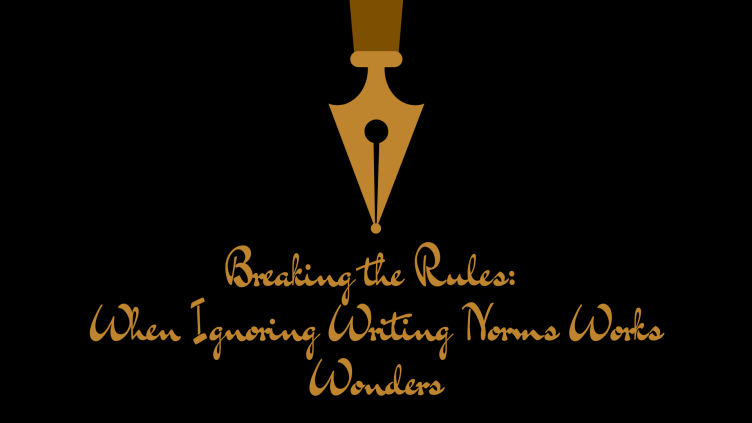Welcome to another exciting edition of Riya’s Blogs! Today, we’re diving into a topic that might seem counterintuitive but is often the key to crafting truly exceptional writing: breaking the rules. Yes, you heard that right! While traditional writing norms have their place, sometimes stepping outside these boundaries can lead to remarkable and memorable results. So, grab a comfy seat and let’s explore how and why ignoring writing norms can work wonders.
The Conventional Wisdom of Writing Norms
Before we break the rules, let’s take a moment to understand what these writing norms are. Generally, they include elements like:
- Grammar and Syntax: Ensuring sentences are well-structured and punctuation is correctly used.
- Clarity and Coherence: Making sure your ideas flow logically and are easy to understand.
- Formality and Tone: Adhering to the expected tone based on your audience and purpose.
- Structure: Following traditional formats for essays, articles, or stories, such as having a clear introduction, body, and conclusion.
These norms are designed to create clear, accessible, and professional writing. However, breaking these norms can sometimes lead to innovative, impactful, and memorable writing. Let’s delve into some compelling reasons why and how this can happen.
1. Creativity Unleashed
When you abandon rigid structures and traditional formats, creativity often flourishes. Take, for example, experimental writers like James Joyce or Virginia Woolf. Their works, such as Ulysses and To the Lighthouse, challenge conventional syntax and narrative forms. This approach allows them to explore deeper psychological insights and new ways of storytelling that might not be possible within standard frameworks.
How to Break the Rule: Experiment with stream-of-consciousness writing or non-linear storytelling. Allow your thoughts and ideas to flow freely, even if it means defying traditional grammar rules.
2. Engaging and Unique Voice
A distinctive voice can make your writing stand out. When you adhere strictly to norms, your writing might blend in with the crowd. Breaking the rules can help you develop a unique style that resonates with readers on a personal level. For instance, blog posts or personal essays often benefit from a conversational tone that doesn’t strictly adhere to formal writing conventions.
How to Break the Rule: Write as you speak. Use contractions, colloquialisms, and a more relaxed tone to make your writing feel authentic and engaging.
3. Enhanced Emotional Impact
Sometimes, breaking the rules can enhance the emotional impact of your writing. By using unconventional formats or grammar, you can create a sense of urgency or immediacy. For example, the use of fragmented sentences or varied punctuation can convey heightened emotions or tension more effectively than traditional prose.
How to Break the Rule: Use short, impactful sentences to build suspense or convey urgency. Don’t be afraid to play with punctuation to create emphasis or rhythm.
4. Breaking the Norms for Effect
Breaking writing norms isn’t just about flouting rules for the sake of it. It should be a deliberate choice made to enhance the effectiveness of your writing. For instance, in a personal narrative, deviating from conventional sentence structures can better reflect the chaotic nature of a memorable experience.
How to Break the Rule: Consider the purpose of your writing. If deviating from norms serves a specific effect or purpose, such as conveying a unique perspective or emotional depth, it’s worth exploring.
5. Cultural and Genre Shifts
Different cultures and genres have different expectations. What’s considered a norm in one context might be unconventional in another. For example, science fiction and fantasy genres often bend the rules to create imaginative worlds and unique languages. Similarly, cultural storytelling traditions might prioritize oral over written norms, affecting how narratives are structured and delivered.
How to Break the Rule: Research genre-specific conventions and cultural storytelling practices. Embrace and adapt these conventions to fit your narrative, even if it means breaking traditional writing rules.
6. Reader Engagement and Curiosity
Unconventional writing can pique reader curiosity and engagement. Readers might be more intrigued by a story that plays with form or challenges traditional norms. For instance, interactive narratives or mixed media presentations invite readers to engage in new ways, making the reading experience more dynamic and memorable.
How to Break the Rule: Incorporate interactive elements or multimedia into your writing. Create a narrative that encourages readers to think critically and engage actively with the content.
7. Innovative Perspectives
Breaking the rules can also lead to fresh perspectives and innovative ideas. By stepping outside of conventional frameworks, you open yourself up to exploring new ways of thinking and presenting information. This can be particularly valuable in academic or professional writing, where traditional approaches might limit creative problem-solving.
How to Break the Rule: Challenge existing perspectives and frameworks. Don’t be afraid to propose new theories or viewpoints, even if they go against established norms.
Conclusion
In summary, while writing norms and conventions have their place, breaking the rules can lead to extraordinary results. Whether it’s unleashing creativity, developing a unique voice, or enhancing emotional impact, defying traditional expectations can provide new and exciting opportunities for your writing.
At Riya’s Blogs, we celebrate innovative approaches to writing. Embracing unconventional methods can lead to some of the most compelling and memorable content. So next time you find yourself adhering strictly to writing norms, remember that breaking the rules might just be the key to unlocking your next great piece.
Feel free to share your experiences with breaking writing rules in the comments or reach out to us at Riya’s Blogs for more tips and inspiration on creative writing!
Happy writing!






